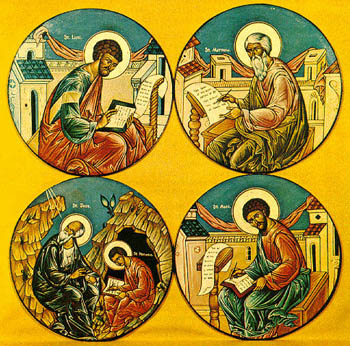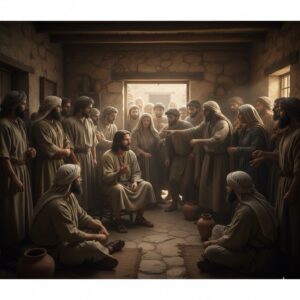Non-Christian scholars and laypeople alike have argued that we don’t know or can’t know who wrote the gospels. The gospels are written anonymously, they say, and the names attached to them as we find them in our English Bibles were given to them as a scheme to make their content more credible. After all, if the people writing these things were actually there, that boosts their credibility, doesn’t it? The Non-Christian charge that Matthew didn’t really write Matthew, that John didn’t really write John, etc. These were written by people whose identities remain unknown and they attached the names to the gospels to make their claims about Jesus seem legit.
However, I think there are some good reasons to believe that the names attached to these gospels really are the people who wrote them and that the skeptics are wrong. This will not be an exhaustive treatment of the gospel authorship issue, but let me briefly mention three reasons we can believe in the traditional authorship of the gospels.
Reason 1: If people wanted to make up names for the authors of the 4 canonical gospels, they would most likely have chosen weightier names for them.
I have a question for people who say that the canonical gospels are forgeries with the names of the apostles attached to give their content credibility. If people wanted to make up names for the authors of the 4 canonical gospels, then why didn’t they choose weightier names for them? Names like Peter, Phillip, Mary, James, these names carry a lot of weight. But Mark and Luke weren’t even part of the original 12 disciples, nor were they apostles. Matthew was, but he was a hated tax collector and therefore would have been a less likely candidate. I mean, you’re writing a document to convince Jews that Jesus is the Messiah and you’re going to make the author a person from a group of people the Jews were known to have an intense hatred for? I don’t think so. John was one of Jesus’ “inner three”, so he’s the exception. I’ll grant that John’s name carries a lot of weight, but this “they-gave-them-names-to-make-the-documents-more-credible argument just simply doesn’t work for the other three gospels.
If I were trying to make the canonical gospels more credible by attaching false authors to them, I would have named them things like “The Gospel of Peter”, “The Gospel Of Mary”, “The Gospel Of Thomas”, or if you really wanted to induce credibility, “The Gospel Of Jesus”. After all, who could be a better eyewitness to Jesus’ life and teachings than Jesus Himself?. The canonical gospels don’t bare these extremely weighty names. However, it’s interesting that the apocryphal gospels do. And everyone knew these were forgeries because they were written until long after the apostles died (i.e into the late second, third, fourth, and even fifth centuries). That’s one of the primary reasons they didn’t make it into the canon.
Reason 2: The early church is unanimous in their testimony that Matthew wrote Matthew, Mark wrote Mark, Luke wrote Luke, etc.
Papias (ca. AD 70-ca. 163) said that St. Pete was Mark’s scribe. He said; “Mark, having become the interpreter of Peter, wrote down accurately, though not indeed in order, whatsoever he remembered of the things said or done by Christ.” 1 Irenaeus (ca. 115-ca. 202), a student of Ignatius and Polycarp (who were themselves students of the apostle John) wrote: “Mark, the disciple, and interpreter of Peter, did also hand down to us in writing what had been preached by Peter” 2 Clement of Alexandria likewise wrote that those who heard Peter’s teachings “were not satisfied with merely a single hearing or with the unwritten teaching of the divine Gospel, but with all sorts of entreaties they besought Mark, who was a follower of Peter and whose Gospel is extant, to leave behind with them in writing a record of the teaching passed on to them orally.” 3 These earlier church leaders and students of the apostles were in a position to know whether or not Mark authored the gospel of Mark and whether or not he got his information from Peter. Time and time again, they affirm that the Gospel of Mark is indeed written by Mark and that Mark was acting as Peter’s scribe.
Regarding Matthew’s gospel, In his Ecclesiastical History, the church historian Eusebius (A.D. 265-339) quotes Origen (A.D. 185-254), stating,
“Among the four Gospels, which are the only indisputable ones in the Church of God under heaven, I have learned by tradition that the first was written by Matthew, who was once a publician, but afterwards an apostle of Jesus Christ, and it was prepared for the converts from Judaism.”
Irenaeus (A.D. 130-200), who was a student of Polycarp (A.D. 70-160), who in turn was a student of the apostle John, testifies that John wrote John. Furthermore, he asserts that it was written when John was in Ephesus and when he was well on in years. Irenaeus, for example, said “Further, they teach that John, the disciple of the Lord, indicated the first Ogdoad, expressing themselves in these words: John, the disciple of the Lord, wishing to set forth the origin of all things, so as to explain how the Father produced the whole, lays down a certain principle,—that, namely, which was first-begotten by God, which Being he has termed both the only-begotten Son and God, in whom the Father, after a seminal manner, brought forth all things.” 4
Polycarp was a student of John, and Irenaeus was a student of Polycarp. This means they were in the best position of all to comment on whether John wrote the gospel of John. I can imagine Polycarp sitting at John’s feet listening to John telling him all about what Jesus said and did, and then at the end John says “By the way, Polycarp. I’m currently writing a book on this. You’ll be able to get it at Barnes and Noble in a few weeks”.
Reason 3: Forensic Statement Analysis
J. Warner Wallace talks about this procedure in chapter 5 of his book Cold Case Christianity. Forensic Statement Analysis (FSA) is “the careful study and analysis of the words (both written and spoken) provided by a suspect, witness, or victim. The purpose of Forensic Statement Analysis is to determine truthfulness or deception on the part of the person making the statement.” 5 FSA is the art of hanging on every word that a person says. In the work of a homicide detective like Wallace, when they are interviewing witnesses about the events of a crime, detectives carefully scrutinize and dissect every word the witness includes in his or her statement to see if it provides them with any clues about their involvement or lack thereof in the crime. In Wallace’ book, he provides two examples of this. In the first example, Wallace recalls interviewing a man whom he called “Scott” about the murder of a young woman in his city in 1981. His question, the same as it was to the other witnesses he interviewed, was “How did you feel about this woman’s death?” Scott’s response was surprising. “Well, I was sorry to see her dead, you know. We didn’t always get along, but it’s never good to see anyone die”. The detectives knew that the killers stood over the victim’s body and made sure she was dead by nudging her. So, Wallace wrote, “it could be reasonably inferred that the killer ‘saw her dead'”. Of course, this isn’t enough to convict someone of murder. But it is a clue that pointed them in the right direction. The statement was only one piece in a large collection of evidence that ended up indicting him.
In J. Warner Wallace’s investigation of the gospels’ reliability as eyewitness testimony, he applied Forensic Statement Analysis to the text to determine whether the gospels were really written by the people whose names are attached to them. And the amount of FSA clues actually make for a pretty powerful cumulative case for the traditional gospel authorship. Let’s look at some of Wallace’s findings with regards to…
THE GOSPEL OF MARK —
The way the gospel of Mark is worded strongly hints at Peter being the source of the information. As we’ve seen above, the early church’s testimony was unanimous that Mark’s gospel was actually Peter’s gospel.
1: Mark mentioned Peter with prominence.
Peter is featured frequently in Mark’s gospel. He referred to him 26 times in his gospel. Matthew referred to Peter only 3 additional times in his much longer gospel.
2: Mark Identified Peter with the most familiarity
Mark is the only writer who never once used the term “Simon Peter”. He uses the words “Simon” and “Peter” but never “Simon Peter”. This may seem like a silly and frivolous thing to point out, but not when you consider that “Simon” and “Peter” were the most popular male names in 1st-century Palestine. Mark never makes an effort to distinguish between the Apostle Simon with the boatloads of other Simons running around. Compare this to John’s referring of the apostle as “Simon Peter” 17 times.
3: Mark Used Peter As a Set Of “Bookends”
In Cold Case Christianity, Wallace points out that out of the 12 disciples, Mark identifies Peter first (Mark 1:16) and he mentions him last at the very end of his gospel (Mark 16:7). Wallace said that scholars describe this as “inclusio” and noticed this same thing occurring in other ancient writings where the document is attributed to an individual. In these other ancient writings, it was the individual being “bookended” that was also the one who wrote the thing.
4: Mark Omitted Peter’s Embarrassments
If you’re writing a biography of someone and you’re heavily involved in their life, you’d probably have a tendency to leave unflattering and embarrassing details about yourself out, right? You would paint yourself in a much gentler light than someone else would. We find Peter painted in the kindest possible way in Mark’s gospel, far more kinder than the other 3 gospels which recount the same events. For example, while Matthew 14:22-23 calls Peter a doubter and a “man of little faith”, Mark 6:45-52, which records the same event, omits Peter’s involvement altogether. Luke 5 records Jesus’ miracle of the catching of the fish in which Peter doubts Jesus’ wisdom. Yet Mark’s parallel account omits Peter’s cynicism altogether.
5: Mark mentions details that can best be attributed to Peter
J. Warner Wallace explains that “Mark alone included a number of seemingly unimportant details that point to Peter’s involvement in the shaping of the text. Mark alone told us that ‘Simon and his companions’ were the ones who went looking for Jesus when He was praying in a solitary place (Mark 1:35-37). Mark is also the only gospel to tell us that it was Peter who first drew Jesus’ attention to the withered fig tree (compare Matt 21:18-19 with Mark 11:20-21). Mark alone seemed to be able to identify the specific disciples (including Peter) who asked Jesus about the timing of the destruction of the temple (compare Matt 24:1-3 with Mark 13:1-4).” 6
Given this cumulative set of FSA pieces of evidence, the best explanation is that Mark really did write Mark and that he really did get his information from Peter. This conclusion from Forensic Statement Analysis is only made stronger by the testimonies of the early church fathers, and the fact that Mark isn’t a likely name you’d make up if you wanted to forge a gospel.
Forensic Statement Analysis can actually be used to confirm the authorship of the other three gospels, but for brevity’s sake, I’ve chosen to only highlight how it helps the case for Mark’s gospel.
This Is Irrelevant To The Minimal Facts Approach
I’d like to point out that while establishing the authorship of the traditional gospels may be important to their overall reliability and trustworthiness, in The Minimal Facts approach, the issue of gospel authorship is totally irrelevant. It can be set aside. How so?
First of all, Dr. Gary Habermas says that the minimal facts approach only uses data that meet two criteria: (1) the fact must have a lot of evidence in its favor, and (2) it must be nearly universally excepted by all scholars who study the subject, even the skeptical non-Christian scholars.
While I do think the traditional authorship meets criteria 1, it’s obvious that it doesn’t meet criteria 2.
Secondly, the principles of historical authenticity or “The criterion of authenticity” can still be applied to all of the New Testament documents (epistle and gospel alike) to cough up the 5 facts which undergird the inference to Jesus’ bodily resurrection (i.e Jesus died by crucifixion, His tomb was empty the following Sunday morning, that church persecutor Saul was converted on the basis of what he perceived as an appearance of the risen Jesus, and that the skeptic James was converted on the basis of what he perceived as an appearance of the risen Jesus), see here and here.
For example, one argument for the historicity of Jesus’ unoccupied tomb is that all 4 gospels mention women as the chief witnesses to the tomb, and given their low rung on the 1st century Jewish social latter and the fact that they weren’t permitted to serve as witnesses in a Jewish court of law, the gospel authors would never have made women the first on the scene if they were just making stuff up. If they were making up the empty tomb narrative, they would have made males the first on the scene (far more credible witnesses). Now, does it matter whether you find this in the gospels of (A) Matthew, Mark, Luke, and John, or (B) The gospels of Bob, Tim, Suzan, and Randy? No. The criterion would still apply. Group A or Group B would probably have avoided making women the chief witnesses of the empty tomb for the reasons given above if they were simply making it up. The Jerusalem Factor argument would also be unaffected (i.e that the empty tomb is the best explanation for the opponents of Christianity didn’t just produce Jesus’ body to squash the whole thing). You can still make The Jerusalem Factor argument without knowing who authored the gospels.
Or, does it matter in establishing that Jesus died by crucifixion? No, both the canonical gospels and John mention Jesus’ crucifixion, and therefore they can be included in the list of ancient documents that record it along with Josephus, Tacitus, Lucian, Mara Bar Sarapian, and the epistles of Paul. We can still include the gospels as being additional sources in our claim that Jesus’ death by crucifixion is multiply attested, no matter who wrote them.
Now, whether or not Paul wrote 1 Corinthians, 2nd Corinthians, Galatians, and the other epistles would have a bearing on the potency of the minimal facts approach, but virtually no skeptical historian of ancient history doubts that Paul wrote the epistles that bare his name (save for the pastoral epistles), so we apologists don’t have to worry about that.
I bring this up because gospel authorship is one of the things I hear in my debates against skeptics about the minimal facts case for the resurrection of Jesus, and it’s just not relevant. It’s an important issue, but the MF approach does an end-run around this just like it does an end-run around whether The Bible is inerrant, inspired, or even historically reliable. The criterion of authenticity are adequate to extract the 5 facts needed to infer the resurrection.
Conclusion
We have good reasons to believe that the gospels of Matthew, Mark, Luke, and John were written by Matthew, Mark, Luke, and John. Moreover, even if we had no idea, it wouldn’t affect the case for the resurrection.
—————————————————————
Footnotes
1: Papias, quoted in Eusebius, “Church History”, Nicene and Ante-Nicene Fathers, eds. Phillip Schaff and Henry Wallace, (New York Cosimo, 2007), 172
2: Ireneaus, quoted in The Ante-Nicene Fathers: Translations Of The Fathers Down to AD 325 eds. Alexander Roberts and James Donaldson, vol 1. The Apostolic Fathers – Justin Martyr – Irineus, (Buffalo: Christian Literature, 1885), 414
3: Clement Of Alexandria, quoted in Eusebius, “Ecclesiastical History”, Euesebius Pamphili, Ecclesiastical History Books 1-5, trans. Roy J Deferrari (Washington DC: Catholic University Of America, 1953), 110
4: Irenaeus of Lyons, “Irenæus against Heresies, 1.8.5.” in The Apostolic Fathers with Justin Martyr and Irenaeus, ed. Alexander Roberts, James Donaldson, and A. Cleveland Coxe, vol. 1, The Ante-Nicene Fathers (Buffalo, NY: Christian Literature Company, 1885), 328.
5: J. Warner Wallace, “Cold Case Christianity”, David C Cook, page 88
6: J. Warner Wallace, “Cold Case Christianity”, David C Cook, page 93
Discover more from Cerebral Faith
Subscribe to get the latest posts sent to your email.





The overwhelming majority of New Testament scholars, including the overwhelming majority of Roman Catholic scholars who very much believe in the supernatural, miracles, and the bodily resurrection of Jesus, do not believe that eyewitnesses or even associates of eyewitnesses wrote ANY of the Gospels.
Bandwagon Fallacy.
Hope u can do an article on the traditional authorship of the Pentatateuch!
That’s outside my expertise.